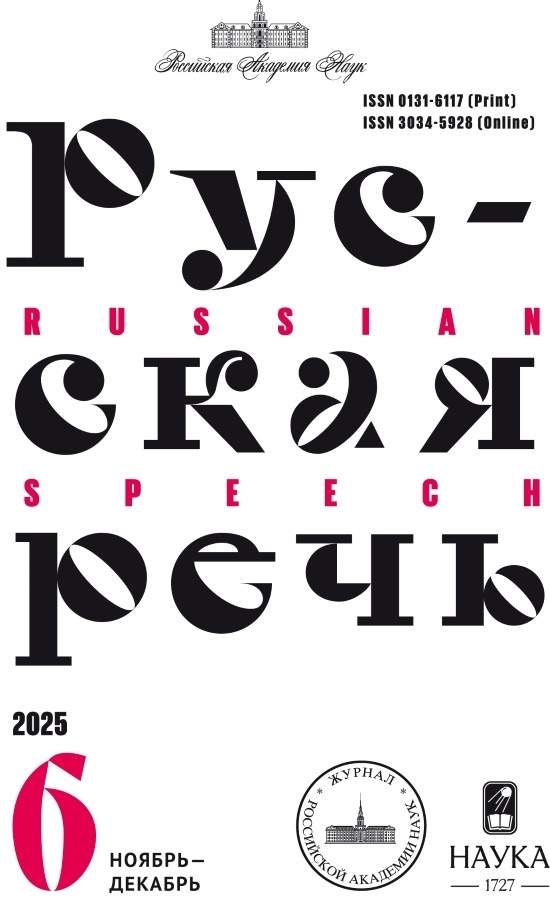Eto Mne Otklikayetsya: New Verb Control?
- Авторлар: Melnikova E.M.1
-
Мекемелер:
- Yaroslavl State Pedagogical University named after K. D. Ushinsky
- Шығарылым: № 6 (2025)
- Беттер: 54-66
- Бөлім: Issues of Modern Russian Language
- URL: https://modernonco.orscience.ru/0131-6117/article/view/696183
- DOI: https://doi.org/10.31857/S0131611725060049
- ID: 696183
Аннотация
The article examines a new construction with the verb otklikat'sya, governing the dative case, which is becoming widespread in modern speech. This construction is presented mainly in colloquial speech and is not yet recorded in standard dictionaries. It is shown that the new control illustrates the concept of syntactic homonymy. The dative case in the new phrase expresses the semantic role of the experiencer - the subject of perception, in contrast to the traditional construction with the dative of the addressee. The complication of the semantic structure of such a phrase is described: the subject of the state, expressed in the dative case, combines the semantics of the "carrier of the state" and the "object" of this state (the one to whom it is directed). In this regard, the combinability possibilities of the verb otklikat'sya are expanding: the role of the subject in statements with such a construction can be played by abstract nouns, denoting what is to be perceived. It is noted that a change in the semantic role of the dative case with the verb otklikat'sya leads to a change in the nature of control: from a weakly controlled form, the dative case becomes a strongly controlled case form, used to express the meaning of the subject of perception. It is indicated that the orientation towards the subjective principle in such combinations is supported by the ability of the verb otklikat'sya to control the prepositional case with the preposition v and the genitive case with the preposition u, which indirectly designates the subject of perception through an appeal to his inner world. The author suggests that the emergence of a new construction is due to the action of the analogy mechanism: the meaning of the verb otklikat'sya is formed under the influence of the meaning and syntactic "behavior" of the verb nravit'sya. Thus, we can trace the development of a new meaning for the verb otklikat'sya (as well as for its synonym otzyvat'sya), including the semes "response action", "emotional response", which are absent in the meaning of the verb nravit'sya.
Авторлар туралы
E. Melnikova
Yaroslavl State Pedagogical University named after K. D. Ushinsky
Хат алмасуға жауапты Автор.
Email: em09@mail.ru
Yaroslavl
Әдебиет тізімі
- Акимова Г. Н. Новое в синтаксисе современного русского языка. М.: Высшая школа, 1990. 168 с.
- Валгина Н. С. Активные процессы в современном русском языке. М.: Логос, 2003. 304 с.
- Виноградов В. В. (гл. ред.). Грамматика русского языка. Т. II. Синтаксис. Ч. 1. М.: Изд-во Академии наук СССР, 1954. 703 с.
- Виноградов В. В., Шведова Н. Ю. (ред.). Очерки по исторической грамматике русского литературного языка XIX века. Изменения в системе словосочетаний в русском литературном языке XIX века. М.: Наука, 1964. 302 с.
- Герд А. С. (ред.). Большой академический словарь русского языка. Т. 14. М.-СПб.: Наука, 2010. 655 с.
- Гловинская М. Я. Активные процессы в грамматике (на материале инноваций и массовых языковых ошибок) // Русский язык конца XX столетия (1985-1995). М.: Языки русской культуры, 2000. С. 237-304.
- Золотова Г. А., Онипенко Н. К., Сидорова М. Ю. Коммуникативная грамматика русского языка / Под общ. ред. Г. А. Золотовой. М.: Институт русского языка им. В. В. Виноградова РАН, 2004. 544 с.
- Крысин Л. П. Об одном типе нарушений синтаксической нормы // Современный русский язык: Система - норма - узус. М.: Языки славянских культур, 2010. С. 200-204.
- Кузнецов С. А. (ред.). Большой толковый словарь русского языка. СПб.: Норинт, 2000. 1536 с.
- Кустова Г. И. Дательный падеж // Русская корпусная грамматика. 2011. [Электронный ресурс]. URL: http://rusgram.ru/new/chapter/nounpar/dative_case/#label_toc341197705 (дата обращения: 28.12.2024).
- Морковкин В. В., Богачёва Г. Ф., Луцкая Н. М. Большой универсальный словарь русского языка. М.: Словари XXI века; АСТ-ПРЕСС ШКОЛА, 2016. 1456 с.
- Шведова Н. Ю. Активные процессы в современном русском синтаксисе (словосочетание). М.: Просвещение, 1966. 156 с.
- Шведова Н. Ю. (гл. ред.). Русская грамматика: научные труды. В 2 т. Т. 2. Репринтное издание 1980 г. М.: Наука, 2005. 712 с.









